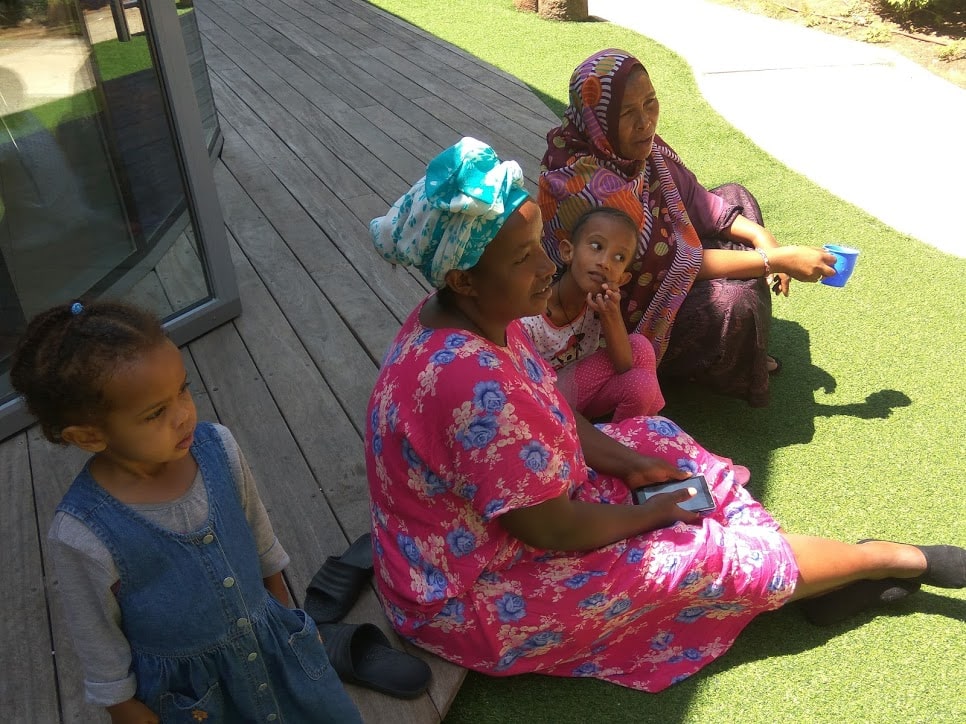Healing Some Hearts, Moving Others

I was recently blessed, as an Israeli guide, to bring a synagogue group to the amazing Save A Child’s Heart program(SACH) at the Wolfson Medical Center in Holon. Here, surgeries are performed on children from developing countries who suffer from congenital and life-threatening heart defects.
When we glimpsed into the program’s Intensive Care Unit(ICU), there were, among others, a Tanzanian child, an Iraqi boy waiting for a very difficult operation, with his mother sitting beside him, and a Palestinian baby, less than two weeks old, completely swathed in white dressings. Leaning over him was an Ethiopian doctor who was part of the program’s training intern program for doctors.
The SACH program saves the life of such a child every 29 hours. Yet the program’s ICU contains only six beds, which are always full—always. Hopefully it will expand to fourteen beds, and those too will undoubtedly be filled.
The statistics are surprising. One out of a hundred children can be born with a heart defect— holes between heart chamber partitions, or leaky valves, or narrow vessels, just as starters. And of those with such conditions, maybe a third or more will require surgery in order to live.
Recently, said the doctor who spoke to our group, he and other Israeli doctors examined several hundred children in Ethiopia in just a few days. So many more would require procedures than the program had the capacity to help. And it was painful, he said, to examine and diagnose a child who he was unable to help.
The SACH program was started 21 years ago by Dr. Ami Cohen, an American who immigrated to Israel. He had performed surgeries on local children while serving as a US army surgeon in Korea. Later, in Israel, he was asked to help Ethiopian children with heart conditions, and from that modest start the program developed and expanded. It has served over 4,000 children. The program became Dr. Cohen’s life work. Tragically, he died in an accident while climbing Mt. Kilimanjaro in 2001. But his drive, infectious optimism and vision have lived beyond him.
Today, the program has three components. Children are flown to the Wolfson Medical Center from around the developing world for surgery. Israeli medical teams fly to other places to screen and examine patients, and doctors from other countries are brought to Israel to serve in intern programs for from one to five years, and then return home to initiate local pediatric cardiology centers.
The young patients arrive from over 51 countries, stretching from Ethiopia to Moldovia to Iraq. And about 50% of the children are Palestinian, who come to local clinics and screenings. Unlike the many children coming from a distance, the Palestinian children go home for recovery after a s certain point. They are usually accompanied by family members, whereas some of the children from abroad, above the age of five or six, may be in Israel for a period of perhaps four months, with no accompanying parent or family member. The Israeli staff and program volunteers become their surrogate families for that period.
Nearby is a new building where the children stay for their period of recuperation and monitoring, and sometimes before they are scheduled for the operation. They can be here for a few months. When you walk into that open small yard, with its toys and greenery and volunteers all around, your heart melts. You want to wrap your arms around every child. A few gangly boys, from Tanzania, Eritrea, Gambia and Ethiopia, played with a small soccer ball. They looked as if they could be galloping through the hills somewhere. Yet here they were, with damaged hearts ticking away inside their young bodies.
Everything is provided by the program. For the screening and exams, diagnosis, travel, surgery, post-surgery follow-through and recuperation, the families of the child patients pay not one cent. Neither do the doctors who are immersed in training for one to five years.
I walked out with a a whole knot of feelings in me. I wanted to bring tour groups here, every group I could. I wanted to contribute personally, in any way I could. And I felt anger, too.
For I wonder if anyone ignorantly throwing the apartheid dart at Israel has bothered to witness Ethiopian or Tanzanian doctors treating local Palestinian children, in an Israeli facility and under Israeli training. And remember, with one in one hundred children burdened by a heart defect, thousands upon thousands of affected children in developing countries lack the opportunity to receive ultrasounds, fetal echocardiograms, or the application of other diagnostic tools. I wonder if someone active in the campaign to boycott Israel might have a child, or know of a relative’s or friend’s child, with a swollen blood vessel or viral infection affecting the heart. Then we’ll see how far that boycott goes.
But laying cynicism aside, I prefer to focus on the incredible blooming of the vision of one man, Dr. Ami Cohen, beyond the borders of his adopted country and beyond his own life. This is a moving reminder of the possibilities of human vision and imagination fused with skills, compassion, determination and commitment. And the dedicated team in the SACH program show how infectious these qualities can be.
To check out more about the SACH program, open the website: http://www.saveachildsheart.com/israel/
